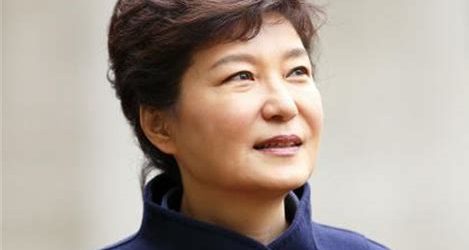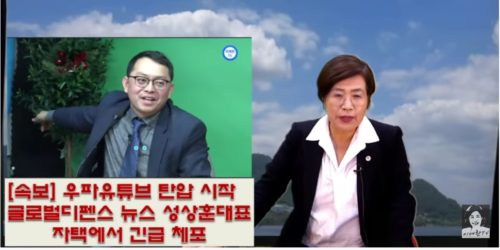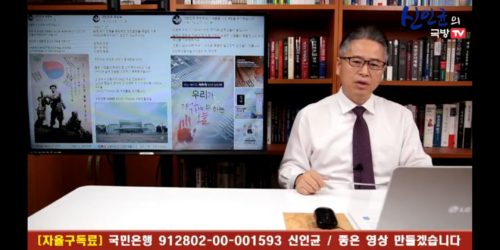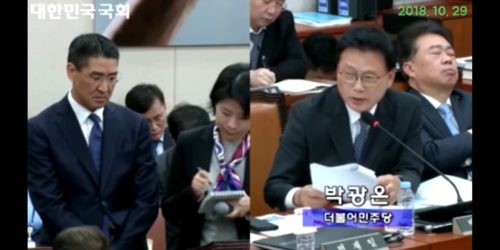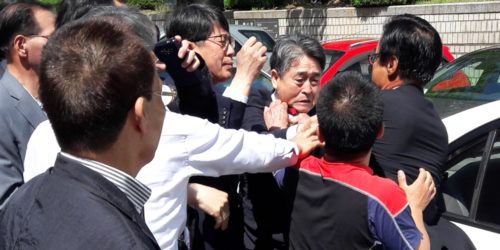Suppression of Freedom of the Press in South Korea: What’s So Special About a Tablet PC that a Journalist is in Jail?
2017-11-25, Tara O
This is an update on journalist Byun Hee-jai (변희재), who was preemptively jailed prior to trial for libel in South Korea. For the original report, see here.
Journalist Byun Hee-jai of Mediawatch has been in jail since May 30, 2018. On the top right corner of the Mediawatch.kr website, it shows how many days Byun has been in jail. Byun was charged with libel for publishing a story that JTBC (a cable TV channel) manipulated the files on a tablet PC to make it appear that Choi Seo-won (Park Geun-hye’s friend, sometimes referred to as Choi Soon-sil) used the tablet. The false news about this tablet that aired on JTBC was crucial to Park Geun-hye’s impeachment. (More on the tablet story later.) The lawsuit claimed that Byun’s remarks slandered JTBC, its then-president of the news section Sohn Suk-hee (손석희), and the JTBC staff, without reasonable grounds. Unlike the U.S., libel is considered a crime in South Korea. It is, however, highly unusual for South Korea to jail a journalist for libel. Furthermore, it is JTBC and Sohn Suk-hee, who have damaged Byun Hee-jai, the other journalists at the Mediawatch, as well as the country with their fabricated tablet story.
Prosecutor Hong Seong-joon (홍성준) is prosecuting the case. The head judge Lee Un-hak (이언학) of the Arrest Warrant Department of the Seoul Central District Court issued the arrest warrant, citing the risk of Byun destroying evidence. The judge in charge of the current trial is judge Park Joo-young (박주영), who denied a bail request for Byun.
First, Byun’s evidence consists of news articles on his 4-person media company’s (Mediawatch) website as well as a published book–The Curse of Sohn Suk-hee (손석희의 저주), in which he disputes JTBC and Sohn’s claims about the tablet PC. It would be hard or impossible to tamper with such published evidence. So why did judge Lee Un-hak deem Byun to be a flight risk and put him in jail?
Second, this arrest was shocking not only because libel in South Korea is not a type of “crime” that requires jailing before or after a trial, but also it was against a journalist who spoke out against the false claims by JTBC about the tablet PC–the unverified tablet news story was used by the National Assembly as a “smoking gun” evidence to prepare and support the articles of impeachment for president Park Geun-hye.
Byun is currently undergoing trial, but he’s not the only one. Also indicted on June 15, 2018 were the entire staff of Mediawatch, who are also journalists: Hwang Ui-won (황의원), Lee Woo-hee (이우희), and Oh Moon-young (오문영). Although they were not arrested, they face the same charge. If judge Park Joo-young (박주영), despite the overwhelming evidence in the journalists’ favor, finds the journalists guilty and punishes them, such as giving them prison sentences, then South Korea’s judiciary under the Moon administration:
- unjustly jails/punishes journalists for doing their jobs
- drives out one of many small media outlets, which can set a precedent to pursue shutting down others
- prompts the South Korean public and the outside watchers to seriously question
- whether freedom of the press is dead in South Korea, and
- why the Moon administration wants to destroy South Korea’s freedom of the press and the rule of law, key pillars of a liberal democracy
About the Tablet
Starting mid/late October, 2016, JTBC started airing stories that raised suspicion about the role of Choi Seo-won (최서원 “Choi Soon-sil). Although her legal name is Choi Seo-won, the media kept using Choi Soon-sil (her former name), which sounds more uncouth and uneducated to Korean ears. Among many rumors the media carried, one was that Choi did not have a college degree (but she did), to make her sound even more unsophisticated. The more Choi was portrayed as uneducated and uncivil, the more offended and angrier the public became.
In October 2016, JTBC’s Sohn Suk-hee appeared on TV to claim that they found a tablet that belonged to Choi Seo-won, that the tablet contained Park’s speeches, and that Choi edited the Dresden speech. JTBC stated that “Choi Soon-sil intervened in pending foreign affairs and national security issues, including the Dresden Speech.” It was implied that Choi runs the country, because she edited the speech.
While this conclusion defies logical reasoning, it lit public passion, prompting them to join the already well-organized candlelight protests to oust Park Geun-hye.
In impeaching Park, they invented new terminology that people had not heard before–“Gukjeong Nongdan” (국정농단). Gukjeong means affairs of the state, Nongdan means monopoly. Park was impeached, not for treason or something extraordinary, but for “Gukjeong Nongdan.” It is difficult to comprehend how editing a speech equates to the person having a monopoly of running a country. Getting back to the term, nowhere in the law does it state that “Gukjeong Nongdan” is a crime nor that it is an impeachable offense. As mentioned, the word has not existed in Korea for thousands of years. And the meaning is nebulous. The public was not sure exactly what the term meant, but it sounded sophisticated and it provided a convenient label to describe a situation that could not easily be explained as warranting an impeachment.
The protests not only called for Park to step down, but also for freeing Lee Seok-gi (who is jailed for sedition) and opposing the THAAD deployment. These other issues were not why the average citizen joined the candlelight protests, but the organizers, such as the militant Korean Confederation of Trade Unions, had multiple aims.
During this time, the media was inundated with false reporting based on rumors and fabrications. The following passages from Byun’s book The Curse of Sohn Suk-hee are small samples of what was going on at the time.
2016-12-1, YTN reported an internet rumor: “U.S. Republican presidential candidate Donald Trump, criticized then presidential candidate Hillary Clinton on 29th of last month ‘if you want to see the end of a woman president, look at the woman president of South Korea’.”
Comment: It turned out Trump had not said such disparaging remarks about Park, according to the Blue House. But YTN published it anyway.
2016-10-27, Joongang Ilbo: “It was revealed that the U.S. assessed that Choi Tae-min was ‘South Korea’s Rasputin.’ Choi Tae-min was the father of Choi Soon-sil, who is suspected of being a ‘legendary flying wizard of influence’ (비선실세). This is from the cable that the former ambassador Alexander Vershbow sent back to his home country during the election period in 2007. This cable was on an expose website Wikileaks after hacking.”
Comment: It was not the U.S. that assessed Choi Tae-min was a Rasputin, but rather the rumor was made by then-candidate Lee Myoung-bak’s camp against then-candidate Park Geun-hye’s camp. According to the document uploaded on No Cut Ilbe, “Park has also been forced to explain her own past, including her relationship some 35 years ago with a pastor, Choi Tae-min, whom her opponents characterize as a ‘Korean Rasputin’…”
2016-9-20, Hankyureh: “The circumstance of President Park Guen-hye’s “legendary flying wizard of influence” Choi Soon-sil being deeply involved in the foundation creation and operation was revealed. She placed the director of a sports massage center she frequented as the board chairman of the K Sports Foundation. Jeong Dong-choon, who was installed as the K Sports Foundation board chairman, ran a sports massage center called ‘Exercise Capability Recovery Center (CRC)” in Shinsa-dong, Gangnam-gu, Seoul.”
Comment: After this article, numerous reports abounded equating Jeong with “massage center chief.” Jeong had repeatedly stated his center has nothing to do with massage, to no avail. According to Cho Gabje of Chogapje.com, “They take a sports medicine Ph.D.’s sport rehabilitation center and keep calling it a ‘massage shop’ and [no one] is correcting the fabrication.”
-Byun Hee-jai, The Curse of Sohn Suk-hee, 24-27
The above are just three of numerous fabrications that swirled through the media, shaping the public perception about Choi as an uncultured character. Thus JTBC portraying Choi as running the country greatly upset the public, and when JTBC claimed that it had evidence–“the tablet PC”–people believed it and took to the streets.
It turned out, according to the prosecutor’s own forensic report, that the tablet PC was not legitimate evidence of the alleged activity. There were no edited files in the tablet, despite JTBC’s claims, which said Choi carried the tablet PC around and edited documents, including the Dresden speech. Additionally, the tablet did not even have editing software (HWP software), so there was no capability to edit the Korean language document. (17:11)
The forensic report was 700 pages long and difficult to understand. (Byun, 119) The report findings were inconclusive as to who owned the tablet. In fact, the tablet was set up by Kim Han-soo (김한수), former Blue House executive officer. Kim Han-soo went to SK Telecom on June 22, 2012 and opened an account for the tablet under his company’s name “Malay Company.” (1:23) This was around the time of the presidential elections. On October 8, 2017, Shin Hye-won (신혜원) came forward to say she used the tablet (she was one of multiple users). Shin worked on then-candidate Park Geun-hye’s campaign in 2012. She saw in the media various photos, documents, and phone numbers found in the tablet and recognized them. Even Ko Young-tae (고영태), a key witness who helped the special prosecutor during the impeachment trial, stated “I understand that she [Choi] is not the type of person who can use a tablet PC,” placing doubt on the claim that the tablet belongs to Choi or that she used it. Choi has also said the tablet does not belong to her, that she does not even know how to use it, that she has never even seen the tablet in question, and asked to see the tablet. (1:40) The prosecutor never showed her the tablet. (1:54)
Despite these and other facts that raise serious questions about the integrity of JTBC’s claim that the tablet is Choi’s and that Choi edited the documents, thereby “having the monopoly of the state affairs”–Gukjeong Nongdan–the National Assembly used the tablet as the “evidence” to impeach Park. Thus Park was impeached based on an absurd, illogical accusation incited by JTBC and the media that stirred up the Korean people’s passions.
After overwhelming evidence emerged that disputed Sohn Suk-hee’s fabricated statements, Sohn stated afterwards that “even if there was no such thing as the [insignificant] tablet PC…, [it wouldn’t have mattered]” implying that Park would have been impeached anyway. It was, however, Sohn’s JTBC TV program that first aired the fake tablet story, which incited people.
JTBC has made other sensational and false reports, such as the claim that the North Korean restaurant workers who defected from China were kidnapped and forced to go to South Korea and other erroneous reports on the Sewol Ferry sinking and Theater High Altitude Air Defense (THAAD).
Sohn Suk-hee’s false tablet story brought down a president and threw cold water on the rule of law, because the court was moved not by evidence, but by public fervor. This libel lawsuit, which the prosecutor is pursuing doggedly, and the way it has been handled by the court threaten freedom of speech in South Korea. It is, however, Byun Hee-jai and other journalists who pointed out the inconsistencies in Korean mainstream media reporting and the actual unreported facts regarding these events who now find themselves on trial. There has been no accountability for Sohn, but rather reward–Sohn Suk-hee was recently promoted to be the CEO of JTBC.
How is the tablet and impeachment relate to Byun Hee-jai? He conducted extensive research to point out various discrepancies in JTBC’s fake tablet story, even during the height of the candle light demonstrations when the public sentiment was such that it was difficult to go against the flow. Byun Hee-jai, Hwang Ui-won, Lee Woo-hee, and Oh Moon-young felt that they had to uncover the truth, as good journalists feel they must do.
Byun Hee-jai has asked judge Park Joo-young for further examination of the tablet to try to determine who it belongs to. Of seven witnesses Byun asked for, the judge allowed only two journalists from JTBC–Seo Bokyun (서복현) and Cho Taek-soo (조택수), and rejected Choi Seo-won, Shin Hye-won, Ko Young-tae, Kim Hans-soo, and No Seung-gwon (노승권) (former prosecutor who lied that the file was in the tablet when it was not) as witnesses. (1:15) It seems pretty clear that the tablet does not belong to Choi. At minimum, there are serious questions whether the tablet is Choi’s or not. As stated above, the prosecutor’s report is inconclusive. Yet prosecutor Hong Seong-joon maintains that the tablet belongs to Choi Seo-won.
If the verdict is not reached by the expiration date of the trial, which is early December, Byun must be released from jail. (1:45) There are signs that the trial is being rushed in order to reach a decision prior to that date–the judge rejected other requests from the accused, including putting the key witnesses on the stand, as stated above, and not allowing an examination to try to determine who owns the tablet. The judge seems set to make a decision without hard evidence. It is still hoped that judge Park Joo-young will admit more defense evidence, look at it carefully, and make a sound decision based on rule of law, even if he has to extend the trial and free Byun. In fact, why are these actions so difficult to do?
The court should show the public and the world that rule of law and the freedom of the press are still alive in South Korea.

